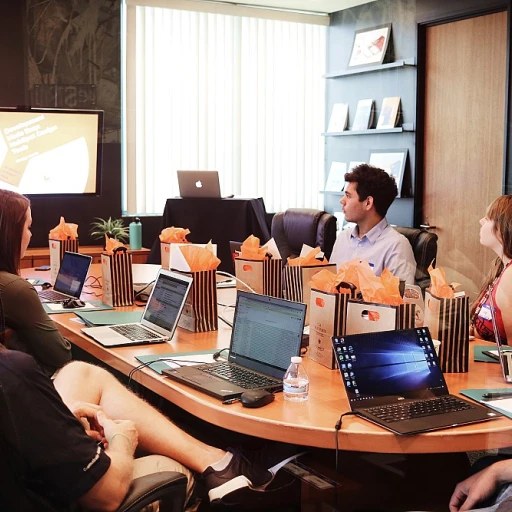
The Core Duties of a Leasing Consultant
Primary Responsibilities and Daily Tasks
A leasing consultant plays a pivotal role in bridging the gap between property management and potential tenants. This vital position involves a range of daily responsibilities aimed at maintaining and enhancing community satisfaction while ensuring that properties remain occupied. To begin with, one of the core duties is handling prospective tenants by managing inquiries and scheduling property tours. These tours give potential residents a chance to experience the apartment environment first-hand and understand the amenities offered. A leasing consultant needs skills in effective communication and customer service to handle any questions or concerns that prospective tenants may have. In addition to conducting tours, another key responsibility is preparing and managing all leasing documents. This includes rental agreements, renewals, and terminations. Ensuring that all paperwork is accurate and up-to-date is crucial for the smooth operation of property management. Moreover, a leasing consultant must collaborate closely with the sales team to develop strategies that will attract the right tenants. This involves creating appealing property advertisements, both online and offline. As part of their roles, leasing consultants also work in tandem with property managers to stay informed about property management policies and any changes in community guidelines or real estate regulations. On a broader scale, the job entails maintaining good relationships with current tenants to cultivate a strong community atmosphere, thereby reducing tenant turnover. This aspect of the job emphasizes the importance of strong interpersonal skills and the ability to resolve conflicts efficiently. If you are exploring new paths in the leasing industry, consider learning more about the opportunities available in PAFDA jobs, which can offer additional insights and career growth options.Skills and Qualities for Success
The Essential Traits for a Leasing Consultant Role
In the world of leasing, having the right mix of skills and qualities is paramount for success. A leasing consultant serves as a fundamental link between property managers and current or prospective tenants, requiring a combination of technical and interpersonal skills to excel in this role.- Communication and Customer Service: At the heart of a leasing consultant’s job is the ability to communicate effectively with potential and existing tenants. This involves providing clear information and answering any questions regarding the properties, creating a positive experience for those considering the community.
- Sales and Negotiation Skills: With an end goal of filling vacant properties, the primary responsibility includes the skills necessary for sales and negotiation. This entails understanding tenant needs and presenting the properties as the ideal solution, ultimately closing deals while following through with leasing duties responsibly.
- Organizational and Time Management Skills: Managing multiple responsibilities can be challenging. A leasing consultant must organize property tours, meet prospective tenants, and coordinate with the team, all while managing time efficiently to ensure compliance with property management commitments.
- Technical Proficiency: The role demands a comfort level with software and tools often utilized in property management. Leasing consultants track inquiries and maintain databases, allowing them to manage their properties and prospective tenants effectively.
The Importance of Market Knowledge
Recognizing the Impact of Local Market Insight
Understanding market trends is crucial for leasing consultants looking to achieve success in their field. A firm grasp of local market conditions allows a consultant to predict changes that may influence leasing strategies and prepare accordingly. Leasing consultants must remain informed about the latest events in their community, allowing them to establish competitive pricing strategies and provide prospective tenants with the most accurate information about available apartments. This knowledge should include data about the surrounding area, such as proximity to amenities, schools, and transportation. In-depth market knowledge gives leasing consultants the tools to effectively fill vacancies and supports sound decision-making in property management. By maintaining awareness of market fluctuations, they can offer insights to the real estate team, strengthening the overall property management strategy. Moreover, this understanding of market dynamics boosts their ability to address tenant inquiries and create tailor-made solutions, enhancing customer satisfaction. This understanding supports their job responsibilities, qualifying them to perform a proactive role as leasing agents. For those leasing consultants aiming to streamline their hiring processes and maximize efficiencies, tools like one-step evaluation can be a game-changer. By integrating advanced hiring technologies, consultants can align their recruitment strategies with market demands, ensuring they attract and retain the right talent for successful property operations.Technology in Leasing: Tools and Platforms
Leveraging Technology in Leasing Operations
In today's digital age, technology plays a pivotal role in the leasing industry, empowering leasing consultants to efficiently manage their responsibilities. The integration of technology in property management has streamlined various tasks, enhancing the overall experience for both consultants and prospective tenants. Leasing consultants are now utilizing advanced tools and platforms to facilitate the leasing process. These tools include property management software that allows consultants to handle everything from property tours to tenant applications seamlessly. This software can automate many routine tasks, such as scheduling appointments and processing rental applications, freeing up valuable time for consultants to focus on customer service and sales efforts. Technology also enhances communication with both current and prospective tenants. Leasing agents often use customer relationship management (CRM) systems to maintain records of interactions and follow up with potential leads efficiently. This ensures a personalized experience for each community member, fostering a strong rapport and building trust. Furthermore, online listings and virtual tours of properties have become commonplace, providing a convenient way for prospective tenants to explore apartment options from the comfort of their homes. This not only expands the reach of property managers and agents but also attracts a wider audience of potential tenants. For effective property management, consultants are expected to have a certain level of tech savviness. This includes being proficient in using various digital tools and platforms essential for daily operations in the leasing job. As technology continues to evolve, leasing consultants must adapt to the latest trends to stay competitive and effective in their roles. In conclusion, embracing technological advancements not only improves efficiency but also enhances the tenant experience, ultimately leading to increased satisfaction and successful property leasing operations. As the industry becomes more digital, the ability to harness these tools effectively will become an indispensable skill for any leasing consultant.Challenges in the Leasing Industry
Overcoming Hurdles in the Leasing Industry
Working as a leasing consultant or leasing agent is a rewarding yet challenging career path. In the day-to-day, these professionals balance an array of responsibilities, from understanding job descriptions to engaging with prospective tenants. However, the leasing sector presents specific challenges that require skills and experience to navigate effectively.
One common challenge is the dynamic nature of tenant preferences and property needs. This requires consultants to stay updated with the ever-evolving real estate market to provide informed property tours and advice. Managing tenant expectations and maintaining high standards of customer service are critical responsibilities of a leasing consultant. Often, tailoring communication styles to fit the community and individual tenant needs can enhance engagement and satisfaction.
Another notable challenge arises from the inherent diversity and variety of job duties. Consultants often juggle activities like coordinating with property managers, processing lease agreements, and participating in sales efforts to fill vacancies. These tasks require excellent time management and organizational skills to efficiently meet deadlines and streamline operations.
Moreover, technology is continually reshaping the industry, introducing new platforms and tools. As a property manager or member of a leasing team, adapting to these technological advancements can be daunting but is essential for success. Software systems and digital applications now play a prominent role in property management and consumer interactions, requiring leasing professionals to be tech-savvy.
In addition, the leasing sector can be susceptible to economic fluctuations, impacting sales cycles and tenant demand. Therefore, strong problem-solving skills and strategic planning abilities are indispensable for overcoming these external influences, ensuring stable performance.
Ultimately, although the leasing industry poses various challenges, they also present opportunities for growth and development. By sharpening their skills and embracing the complexities of the role, leasing consultants can enhance their career prospects while contributing valuable insights to their team and community.
Career Path and Growth Opportunities
Advancing in the Leasing Industry
The leasing industry offers a dynamic career path with numerous opportunities for growth and advancement. As a leasing consultant, your journey can evolve in various directions, depending on your interests and skills. Here’s a look at how you can progress in this field:
- Leasing Manager: With experience and proven success in leasing, you can move into a leasing manager role. This position involves overseeing a team of leasing consultants, ensuring that properties are filled efficiently, and maintaining high levels of customer service.
- Property Manager: Another potential career path is transitioning into property management. As a property manager, you’ll be responsible for the overall operations of a property, including financial management, maintenance, and tenant relations.
- Real Estate Agent: If you’re interested in sales, becoming a real estate agent might be a suitable option. This role focuses on buying and selling properties, requiring strong negotiation skills and market knowledge.
- Specialized Roles: Some leasing consultants choose to specialize in areas such as luxury apartments or commercial properties, which can lead to niche roles with specific responsibilities and challenges.
To advance in the leasing industry, it’s crucial to continually develop your skills and stay updated with market trends. Networking with other professionals and seeking mentorship can also provide valuable insights and opportunities. Whether you aim to become a property manager or a real estate agent, the key is to leverage your experience and build on the foundational skills acquired as a leasing consultant.













